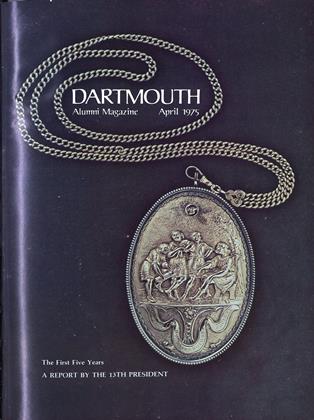Starting his career in the English Department at Dartmouth, Norman F. Maclean '24 moved shortly afterward to the University of Chicago, where he was honored three times for excellence in undergraduate teaching. Now retired and indulging "full time his passion for the American West," Maclean gave a talk two years ago on teaching, which he summed up "as the art of conveying the delight that comes from an act of the spirit, without ever giving anyone the notion that the delight comes easy."
At once charming and eloquent, the talk, published in the University ofChicago Magazine, also contained this episode from the Dartmouth of the 19205:
I started teaching at Dartmouth College immediately after my graduation there, and, also immediately, one of my classes was inspected by a senior member of the faculty. The same thing was done to one of my classes when I started teaching here, but here instead of saying that they were "inspecting" my class they said they were visiting, and sent a woman. But at Dartmouth they sent a man. His name was McCallum and he was tall, red-headed and Scotch, with a long sardonic moustache. He would'have resembled Mephistopheles, if Mephistopheles had been Scotch, as he well might have been.
Like most Scotchmen, he took religion very seriously, only he happened to be an atheist, and would not allow the word God to be mentioned jn his classes. He was the first great teacher I ever had, but naturally my feelings were mixed about being inspected by someone who did not think very much even of God. Still, I regarded him so highly as a teacher that I was sure he would tell me something about teaching when my class was over that, however harsh, would let me in on the secret to the mystery.
I discovered later that he himself had had no mixed feelings about the coming prospect. He thought the whole business was beneath him - and beneath me, for that matter. But it was some years later when I found out these feelings. In the meantime some hours had passed after he inspected my class and he hadn't called me into his office; and then some days, and finally several weeks.
At times in life unexpected silence is a momentary relief, but it can go on until you can't bear it any longer and finally you have to hear something, no matter what. So finally I made an appointment with him at his office and when I came in he asked, "Yes?" as if he didn't know why I came. I couldn't think of any way to approach the subject gradually, so I asked, "What did you think of the class?" And he asked, "What class?" I said, "My class, the one you inspected." Then he said, "It was all right." We had suddenly run out of conversation, but still I couldn't leave. I was still hoping for the secret that would clear up the life that was to come. Finally, I asked, "Don't you have something to tell me that would help me be a good teacher?"
He thought for a while and then said, "Wear a different suit every day of the week." He had come from Princeton.
I said, "I can't afford that." "Well, then," he said, "wear a different necktie."
I had been brought up to believe that you made the most in life of what little you had, and, since this is all that has ever been told me about my teaching, I must confess that I wore a different necktie every day of the week until I retired. I never did get up into the daily suit class.















